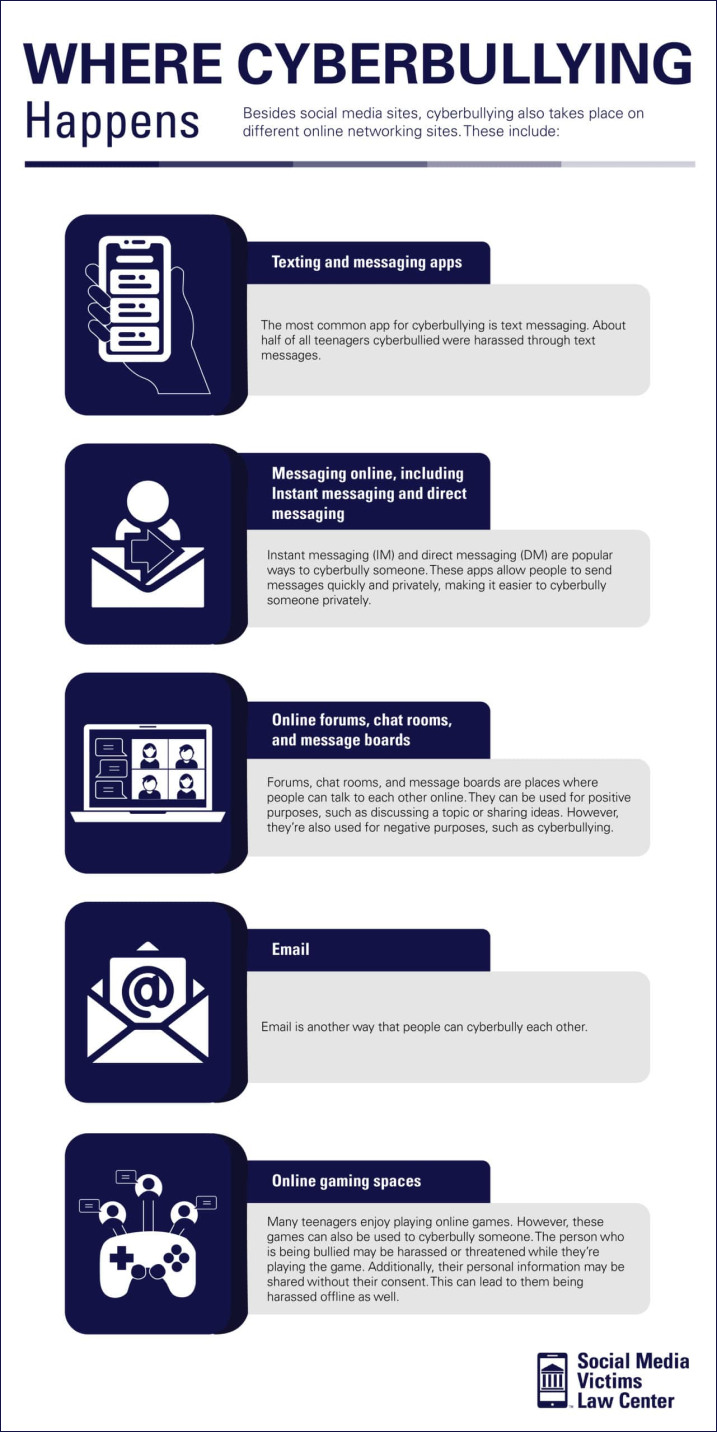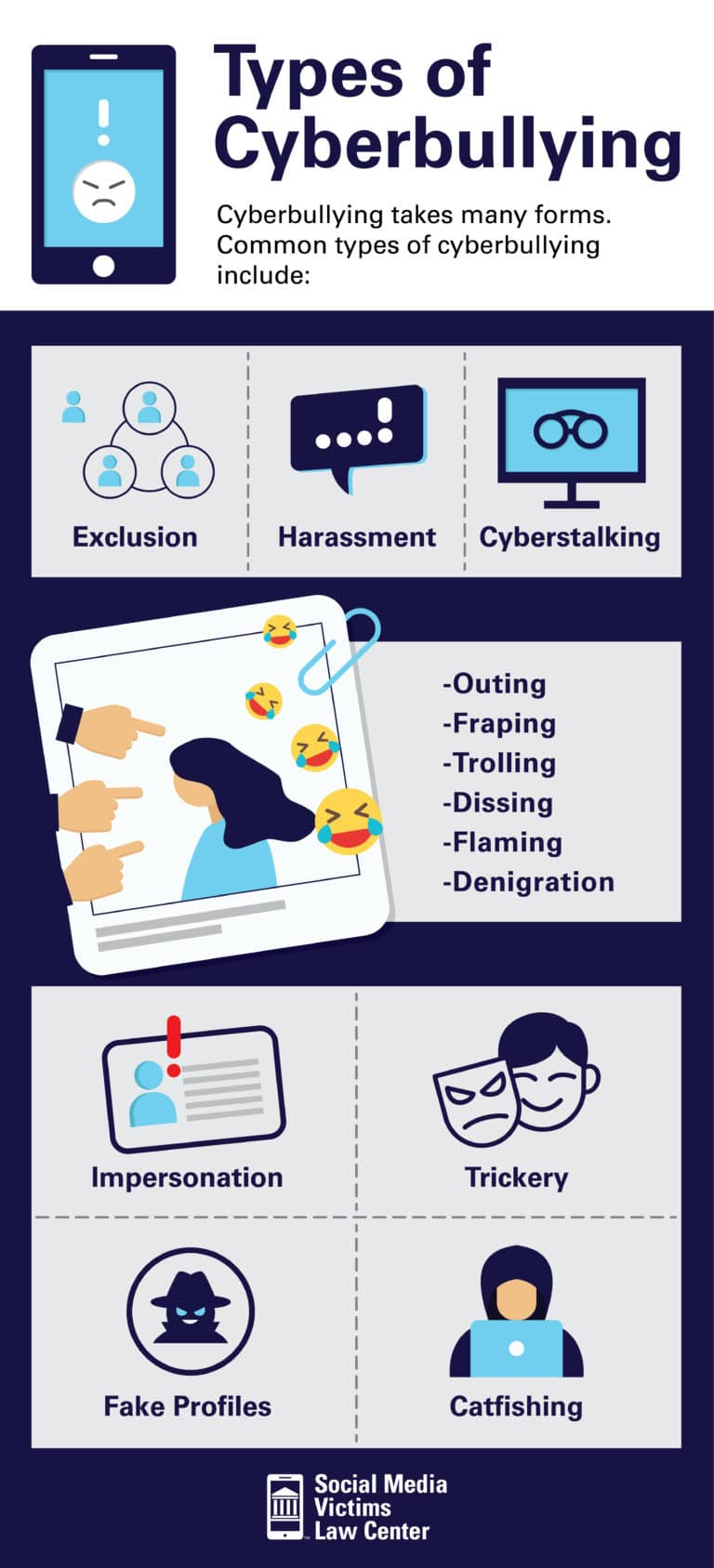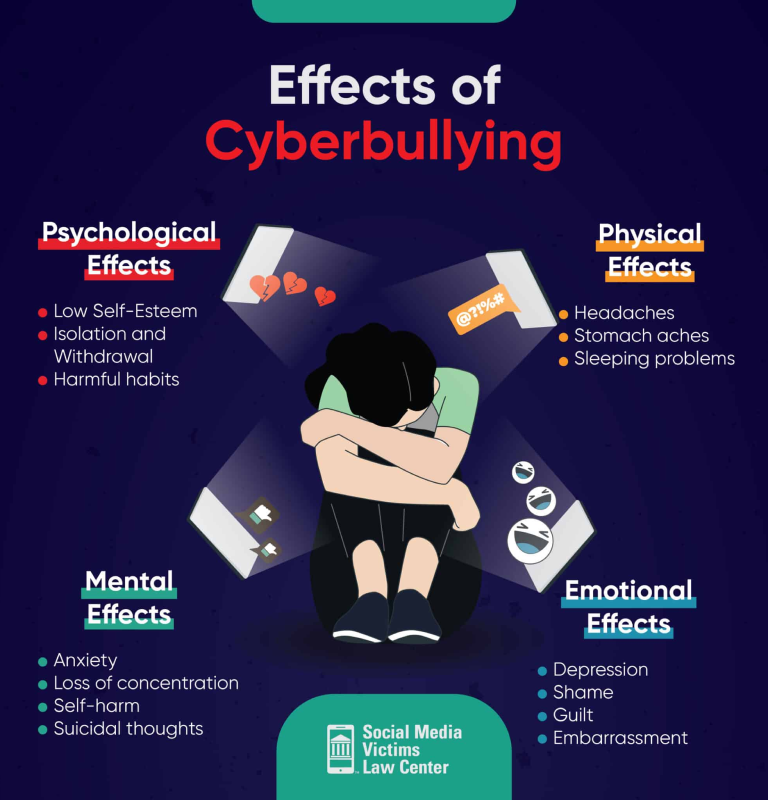Cyberbullying on Social Media
Cyberbullying is a very serious issue on social media and has been increasing in prevalence over the past few years. Cyberbullying can have devastating effects on those who are targeted. It’s important to recognize and understand cyberbullying so that you can intervene to protect your child from further harm.
 Written and edited by our team of expert legal content writers and reviewed and approved by Attorney Matthew Bergman
Written and edited by our team of expert legal content writers and reviewed and approved by Attorney Matthew Bergman
- Content last updated on:
- June 12, 2025
Written and edited by our team of expert legal content writers and reviewed and approved by

- Content last updated on:
- June 12, 2025
What is Cyberbullying?
Cyberbullying is the use of electronic communication to harass, threaten, or humiliate someone. This can include sending mean texts or emails, posting hurtful messages on social media sites, or spreading rumors online. Cyberbullying can be very harmful and can lead to depression, anxiety, and in some cases, even suicide.

Types of Cyberbullying
As the internet continues to evolve, so do the different types of cyberbullying on social media platforms. Teens and young adults are subject to the threat of multiple types of online harassment, including cyberstalking, outing, doxing, fraping, and catfishing, to name a few.

Common types of cyberbullying include:
- Exclusion – To intentionally leave someone else out of an online group or message thread.
- Harassment – To send persistent and hurtful online messages to a victim. These messages can contain threats.
- Cyberstalking – To monitor a victim’s online presence closely.
- Outing – To openly reveal a person’s gender identity or sexual orientation without their consent.
- Doxxing – To maliciously share personal data about an individual online that wouldn’t normally be publicly known to harass or intimidate a victim.
- Fraping – To use a victim’s social media accounts to post inappropriate content with the victim’s name attached to it.
- Trolling – To post derogatory comments about them online in the hopes of hurting these individuals.
- Dissing – To spread cruel information about the victim.
- Flaming – To post about or send insults and profanity to a victim.
- Denigration – To send, post, or publish false information online about the individual.
- Impersonation – To post comments on social media and chat rooms in the individual’s name.
- Trickery – To befriend a victim until the targeted individual feels comfortable sharing secrets and other sensitive information, and then publicly releases the information.
- Fake Profiles – To set up fake online profiles on behalf of victims.
- Catfishing – To create a fake online identity and pretend to be someone else.
Examples of Cyberbullying
Examples of cyberbullying include:
- Sending mean texts or emails
- Posting hurtful messages on social media
- Spreading rumors online
- Circulating false or embarrassing information about someone else.
- Posting or sharing private images
- Impersonating someone online to hurt their reputation
- Excluding someone from an online group
- Creating hate groups or websites against a particular person
Cyberbullying has been linked to teen depression. It can cause teens to feel increasingly anxious, embarrassed, and worried. In these instances, teens can experience physical and emotional trauma. Cyberbullying can also reach a point where it causes teens to contemplate or complete suicide.
Effects of Cyberbullying
Cyberbullying can also have adverse effects on those who witness it happening to someone else. They may feel scared, helpless, and sad. They may also have trouble sleeping and eating and may even develop anxiety and depression.

Generally, cyberbullying effects can be classified under the following:
- Psychological effects – low self-esteem, isolation and withdrawal, harmful habits
- Physical effects – headaches, stomach aches, sleeping problems
- Mental effects – anxiety, loss of concentration, self-harm, suicidal thoughts
- Emotional effects – depression, shame, guilt, embarrassment
Signs of Cyberbullying to Look Out For
Chances are your child won’t tell you if they’re being cyberbullied. Most teens try to handle cyberbullies on their own. Therefore, recognizing cyberbullying and intervening when it’s happening can provide you with an opportunity to help your child handle the situation appropriately in a way that’s most beneficial to their long-term well-being.
Signs of cyberbullying to be aware of include:
- Becomes upset or sad often while using a device
- Withdraws from social interaction
- Detachment from friends, family, and activities or hobbies
- Low academic performance or academic problems (i.e., not doing schoolwork, missing assignments, not studying, failing tests, etc.)
- Refuses to attend school
- Shows signs of depression or sadness
- Anger, rage, or heightened irritability or frustration
- Suicidal ideation and depressive symptoms
- Depression, anxiety, and low self-esteem
- Frequent headaches, stomachaches, poor appetite, and sleep disturbances (e.g., nightmares or insomnia)
How to Report Cyberbullying
Reporting cyberbullying is critical to protecting both the victims of current cyberbullying and any possible future victims. Furthermore, timely reporting can help hold the bully accountable and reduce the risk of further damage. At Social Media Victims Law Center, we recommend reporting to online service providers, law enforcement, and schools.
If you need immediate assistance, there are resources available to you, including:
- If there’s a crime, call 911.
- If you or your child is feeling hopeless or having suicidal thoughts, talk to someone now:
- Call 1-800-273-8255 (TALK)
- Chat with Lifeline
- Visit the National Suicide Prevention Lifeline
- Spanish-speaking Lifeline or 1-888-628-9454
- Deaf or hard of hearing hotline: 1-800-799-4889
- You can also find your child a mental health counselor in your area, or contact your child’s school counselor.
Reporting Cyberbullying to Online Service Providers
Review the terms of service provided by the online platform, including social media providers. Cyberbullying often violates the terms that users agreed to when signing up for the platform. If the user violates those terms, report them directly to the social media site. Most platforms will offer a “contact” or “report” option that allows you to report those interactions quickly.
Reporting Cyberbullying to Law Enforcement
Some types of cyberbullying are not considered crimes, including name-calling or excluding someone from online groups or interactions. Others, however, are crimes. You need to report cyberbullying to local law enforcement in the event of any of the following:
- The bully has issued threats of violence against you, your child, or a third party
- The bully has sent sexually explicit images or pornography, especially of a minor
- The bullying has engaged in online harassment or stalking
- The bullying includes anything that constitutes a hate crime
Call your local non-emergency line and report the bullying. Let officers know what was said, when the interactions occurred, and what platforms were used. Officers may ask you to provide screenshots and evidence of the interactions.
Reporting Cyberbullying in Schools
Now more than ever, children are surrounded by technology. They use their phones or laptops in class. Some students take classes online or complete online assignments during their regular school days. Unfortunately, that also makes cyberbullying more prevalent than ever.
When cyberbullying occurs on a school platform, including a school message board, online classroom, or website, you can report it to the school. You can also report cyberbullying when perpetrated by a student at your child’s school or another institution. Call the school directly and ask to speak to a principal about the bullying your child has faced.
Be prepared to ask for any necessary accommodations, including steps to ensure your child’s safety. For example, you might ask for the bully’s removal from your child’s class or the option for your child to block the bully on school-sponsored platforms and messaging apps.

Cyberbullying Laws in Your State
All states address bullying differently with established laws. Additionally, many have developed model policies for schools and education districts. Some states require bullying education programs.
California Cyberbullying Laws
Education Code Section 234-234.5, also known as the Safe Place to Learn Act, allows the state of California to ensure local educational agencies provide sufficient actions to reduce discrimination, harassment, violence, intimidation, and bullying.
California law requires school districts to:
- Adopt a policy that prohibits discrimination, harassment, intimidation, and bullying
- Adopt a process for receiving and investigating allegations of discrimination, harassment, intimidation, and bullying
- The process must include a requirement for school personnel to intervene, a timeline to investigate and resolve claims, and an appeal process.
- Publicize the policies and the complaint process and post them in all schools and offices
- Maintain documentation of all complaints and resolutions for at least one review cycle
- Protect complainants from retaliation and keep their identity confidential, if appropriate
Florida Cyberbullying Laws
Under Florida law, cyberbullying of a student or employee of a public K–12 school is prohibited in the following scenarios:
- During education programs or activities
- During school-related or school-sponsored programs or activities
- On the school bus
- Through the use of data or computer software on school premises
- Through the use of data or computer software at another location that disrupts the school’s education process or operation or interferes with the victim’s ability to perform academically or partake in school activities or opportunities
Texas Cyberbullying Laws
Texas has enacted legislation to combat cyberbullying and cyberstalking, acknowledging the severity of these offenses. The state’s laws provide legal recourse for victims and hold perpetrators accountable for their actions.
Under these laws, engaging in cyberbullying or cyberstalking can result in criminal charges, fines, and even imprisonment, depending on the severity of the offense. Both parents and teenagers must familiarize themselves with these laws to understand their rights and responsibilities online.
Michigan Cyberbullying Laws
The Michigan Penal Code includes provisions that criminalize cyberbullying. Under section 750.411x, cyberbullying is a misdemeanor offense punishable by up to 93 days in jail, a fine of up to $500, or both. However, more serious consequences can be imposed for additional instances of or a continued pattern of cyberbullying.
Nevada Cyberbullying Laws
Some key cyberbullying laws in Nevada include:
- Nevada Revised Statutes Annotated §388.132: This law seeks to provide a respectful and safe school environment free from bullying, cyberbullying, and discrimination.
- Nevada Revised Statutes Annotated §388.134: This law seeks to provide a safe and respectful learning environment. School-governing bodies must establish policies that promote safe, secure, and ethical computer use and train school personnel. These policies must be reviewed and updated annually.
- Nevada Revised Statutes Annotated §388.135: This law explicitly prohibits bullying and cyberbullying in any context, including in schools. It establishes the responsibility of school officials to take appropriate disciplinary actions against offenders.
- Nevada Revised Statutes Annotated §388.1351: This law requires staff members to report any violation of anti-bullying policies to administrators. Schools must investigate reported incidents promptly, notify parents or guardians, and provide written reports of the investigation’s findings.
- Nevada Administrative Code §388.890: This law makes principals or other designees responsible for ensuring the safety and well-being of victims when incidents are reported. They must take appropriate actions to address the situation.
How to Talk to Your Teen About Cyberbullying
Here are a few things that parents can do if they think their teen is being cyberbullied.
Talk to Your Teen About What’s Going On
Start with open-ended questions to get your teen talking. Ask what’s going on, what they’re feeling, and whether they’ve tried to stop the bullying. Listen without judgment and let your teen know that you support them.
Show Your Teen That You Support Them
Parents can show their support for their teens in many ways. Some parents might want to show their support through words, while others might show it through actions. No matter what you do, make sure that your teen knows that you’re there for them and that you will help them get the bullying stopped.
Help Your Teen Block the Bully From Contacting Them
If your teen is being cyberbullied, help them block the bully from contacting them. This can be done on social media sites and messaging apps.
Report the Cyberbullying to the Website or App Where It Took Place
If your teen is being cyberbullied, report it to the website or app where it’s happening. This will help get the bullying stopped.
Get Professional Help if Your Teen Is Feeling Overwhelmed or Suicidal
If your teen is experiencing many adverse effects from cyberbullying, they may need professional help. Make sure that you encourage young people to seek out help and support if they need it.
Holding Social Media Companies Accountable
If you have questions or concerns about cyberbullying or your teen’s social media usage, or your teen suffered psychological or physical harm due to cyberbullying, contact Social Media Victims Law Center today for a free consultation.
Cyberbullying Lawsuit Case Review
Has your child suffered physical and mental harm from cyberbullying?